

Discover more from Israel from the Inside with Daniel Gordis
Remembering 9/11 ... and 10/7
On a day on which we honor the memory of September 11, recollections of a visit to "Ground Zero" decades ago, and to the Nova Music festival site very recently.
As today is September 11, it felt critically important to remember, to reflect, to wonder.
9/11 seems so, so long ago. Perhaps that is because it has, indeed, been more than two decades, and perhaps, as well, because in the midst of this soul-consuming war, it can feel difficult to engage fully with yet another tragedy, as well.
At the suggestion of my colleague, Haley Weinischke, we went back to something I’d written right after September 11 (it appears in my 2003 book, Home to Stay: One American Family's Chronicle of Miracles and Struggles in Contemporary Israel). In 2001, the year of 9/11, Israel was also at war, in the Second Intifada.
I was struck by how similar some of our collective feelings back then were to what many of us are feeling today.
SEPTEMBER 11, 2001 JERUSALEM, ISRAEL
It’s been two hours since the World Trade Center disaster. I was at my office with Talia, our fifteen-year-old daughter, when a colleague called to ask if I’d heard the news. I hadn’t—I’m sick of the news. I try to log on to some decent web site, but there’s no way to get in. They’re jammed. I pack up my briefcase and we run home.
We’re glued to the TV. Talia and Avi, our twelve-year-old son, are silent, taking in the images that are beyond horrible. Micha, our eight-year-old son, eventually wanders in, and we explain what’s happened. To our surprise, he watches for a few moments and then bursts into tears. My wife and I follow him into the living room and sit on the couch with him. He says he’s crying because when he was in New York two weeks ago, he wanted to go to the top of the World Trade Center, but we said we didn’t have time. Now, he says, he’ll never get to go.
But we know it’s not really that. This is the New York City from which he has just come, the place where he was safe from all this. Central Park. Ice skating in Chelsea Piers. Now he knows—there’s really no escape.
He’s only eight years old, and he has nowhere to run to. “Is Uncle Elie OK?” Avi wonders. We’ve been trying to call the States nonstop, but there’s no getting through. We try e-mail, but have yet to get answers. We assure him that Uncle Elie, my brother, is fine. “But how can you be sure he didn’t go down there for a meeting?” he asks. We can’t of course, but there’s no way to reach him. Avi goes to sleep on the verge of tears.
Mostly we’re watching CNN. But we occasionally take a look at Israeli TV, which in addition to the news from New York is showing celebrations in the West Bank. In Nablus, Palestinians are giving out candies in celebration, and gunmen are firing assault rifles into the air to applaud the deaths. In the refugee camp of Balata, and in the Palestinian cities of Tulkarm and Bethlehem, similar celebrations.
Rereading these words about the celebrations of 9/11 in Balata, Tulkarm and Bethlehem, among other places, I couldn’t help but remember the comments that Ari Shavit, one of Israel’s most respected journalists, made in our podcast conversation about how the rise of radical Islam was a key contributor cause to October 7.
The truth is, 9/11 and 10/7 have more in common than it might seem.
It feels as though we’re surrounded by evil, everywhere. Micha’s right—there’s no escape, and it seems almost impossible to sustain the optimism that everything will one day be OK. We’re just back from our summer vacation, and already I desperately need a break. I realize that I’m ready for the holidays, for the beginning of a new year. Of course this past Rosh Hashanah was the beginning of all the horror [of the Second Intifada], so it’s hard to know how optimistic to be. But still, as I look out the window at the beauty of Jerusalem, even in the dark of night, a city that’s survived attack and siege for thousands of years, despite everything, hope still seems to win out over despair. Maybe, just maybe, next year will be better.
Two months after 9/11, long before the site was open to the public and it was still very much a crime/disaster scene, a person in New York with access to the site got me in:
He picks me up on Eleventh Avenue in the early afternoon, and we drive south towards where the World Trade Center used to be. As we get closer, there are people on the sides of the streets holding up large placards—“God Bless You,” “God Bless America,” “God Bless the Rescue Workers”—and I’m struck by the fact that almost two months after the attack, people are still so moved. Back home, [after a terrorist attack] we sweep up the glass, bury the dead, and clean off the street so that by the next morning, or the day after at the latest, there’s little record of what happened. The glass merchants are used to replacing an entire storefront at the drop of a hat, and you can get your store painted at virtually any hour of the day or night. There’s something healthy here, it strikes me, about recognizing what a sickening assault on life these attacks are, no matter where they happen….
We park the car and take vests, helmets, and breathing apparatuses out of the car. Even here, a few blocks away, there’s a stench in the air that makes it hard to breathe. Helmets on and masks over our mouths and noses, we begin to walk to “the pit.” I’m struck by the calm, the cleanliness, the order. Newly installed chain-link fences everywhere, signs indicating who can and cannot enter each area. Soot-covered windows, most of which now have phrases etched with someone’s gloved fingers: “We Will Never Forget.” “God Bless America.” And deference. Men in suits speaking respectfully to the hard hats. The hard hats nodding to us. Everyone making room for everyone else. It’s a construction site now in many ways, but there’s an abiding awareness of what happened here, and none of the typical shouting and crassness that you expect at a construction site. This is a people newly touched by this sort of evil, and they seem humbled, deferential, respectful. This is, quite clearly, now holy ground…
Holy Ground. The only time I’d felt that before in my life was when I was a young kid and my parents took me to Gettysburg. After my 2001 visit to Ground Zero, the next time I felt it was when I visited the scene of the Nova music festival, more on which below.
… I find myself staring up, searching for the blue sky in the midst of all this. Every few minutes, the gentle New York breeze shoos the soot away and the blue returns. There’s an eerie peace and tranquillity here, a predictability of the process that will continue for days to come. Metal will be moved, the fires will smolder. Someone will hose down the work area, and within a few minutes the blue sky will return. The smoke will be gone.
And in a strange way, I find myself jealous of that normalcy that is bound to return, even to here. Yes, this is a changed country, a wounded city, and some things will never be the same. The loss of life was beyond horrendous, the suffering of those left behind virtually indescribable. But here, the president assured his nation that this won’t go on, that he will stop this. At home, our prime minister gets on TV and tells us “we must prepare for a long and drawn-out conflict. This will not be over soon, and we must be strong.” Here, security is much tighter. The evil that did this is being pursued across the world, and the sheer size of the rest of the buildings downtown seems to say, “Wounded, but not destroyed.” This city will bounce back, and I wonder, after whatever is built here is built, how much will really be different? Was this about a horrid attack, or a changed way of life? I suspect that it was the former, and I feel guilty for the envy that I can’t push away. ….
Perhaps I’m wrong, but that difference still feels relevant to me. Twenty-something years later, the families of those lost on 9/11 are still hurting, carrying loss that will never heal. But is America fundamentally different than it was before? I’m not sure. Will Israel be fundamentally changed by 10/7? I think that it will.
The question that none of us can yet answer is, “How will it be different?”
…. I glance at my watch. Just about bedtime for the kids in Jerusalem. And I wonder: How do you put out a fire that spews forth from deep in the land, a fire that seems willing to burn forever? How do you extinguish the smoldering ruins of what used to be, before they hide clear blue sky forever?
A few weeks ago, I went with my brother (the same brother mentioned above) to help out at a farm near the Gaza Envelope that was desperate for manpower. After a long, hot day of picking grapes, we decided—before making our way back to Jerusalem—to stop by the Re’im site where the Nova festival had been held and the massacre had been perpetrated.
It’s its own sort of hallowed ground these days, so below, are a few photographs to illustrate how uniquely Israeli this memorial has become.
[In the photo galleries that follow, if you click on a specific photo, it should become larger and clearer.]
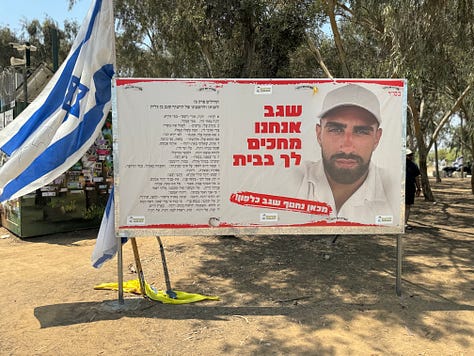
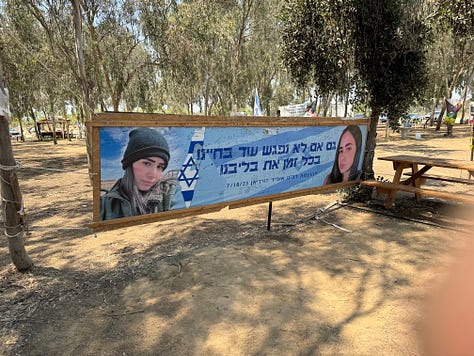
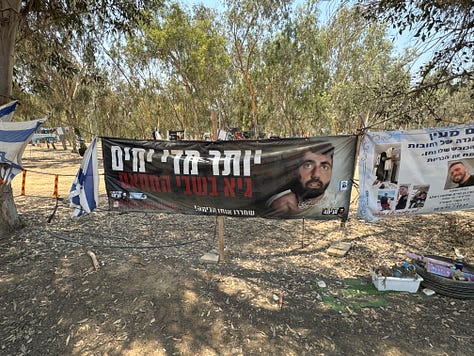
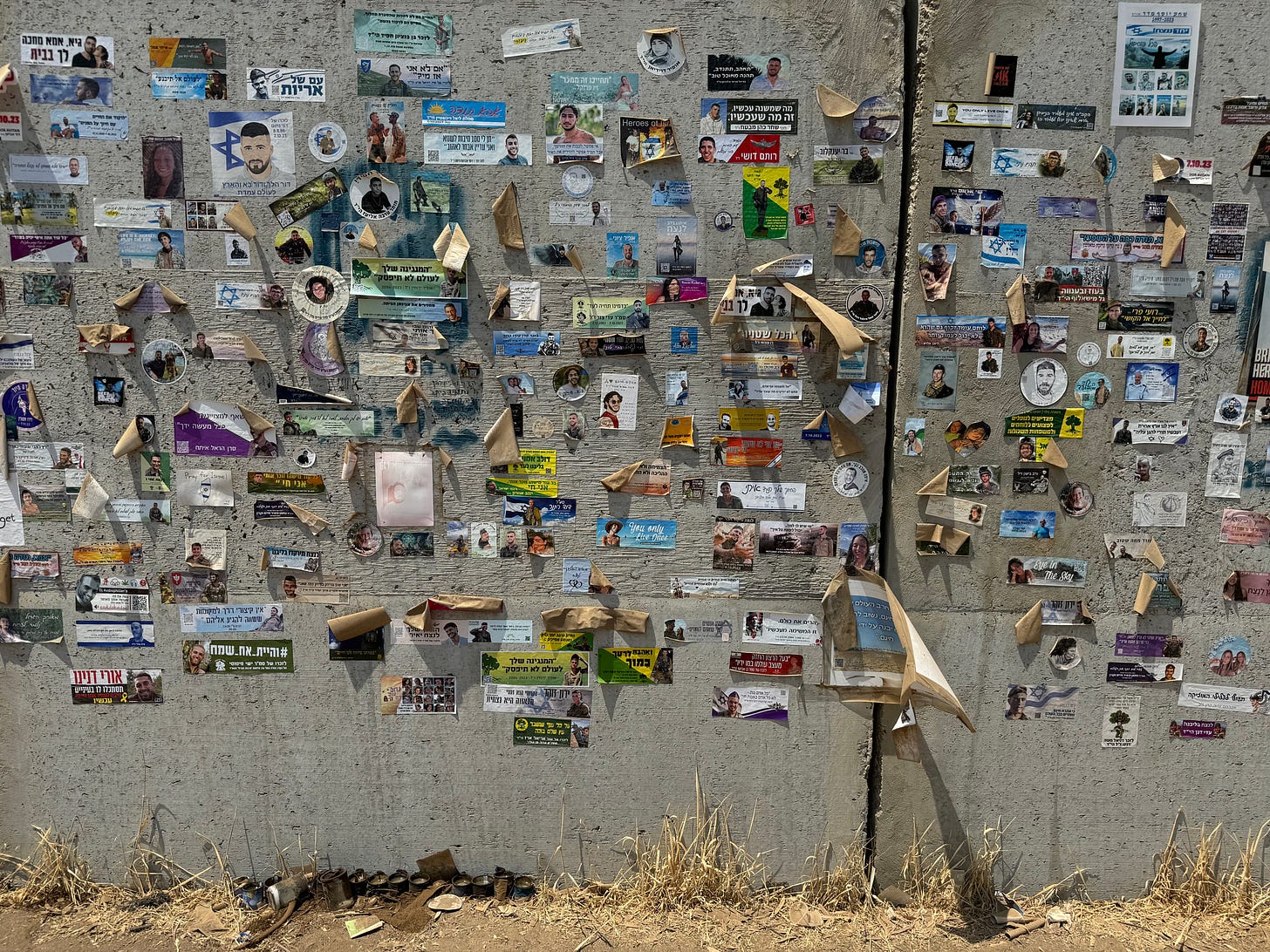
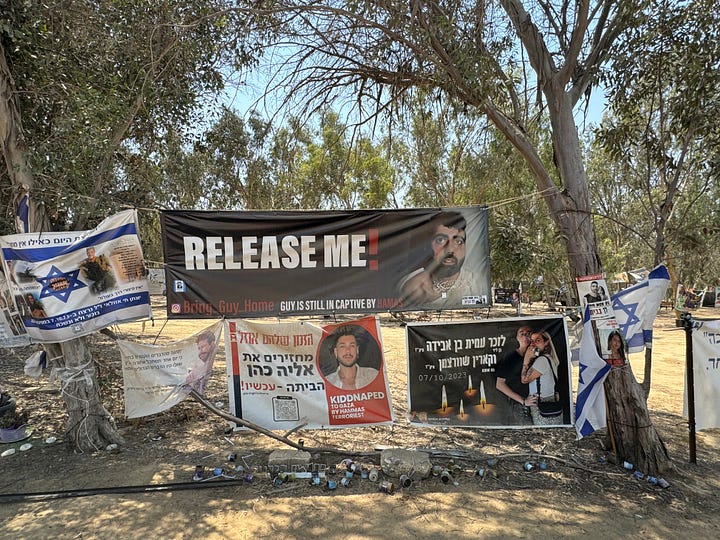
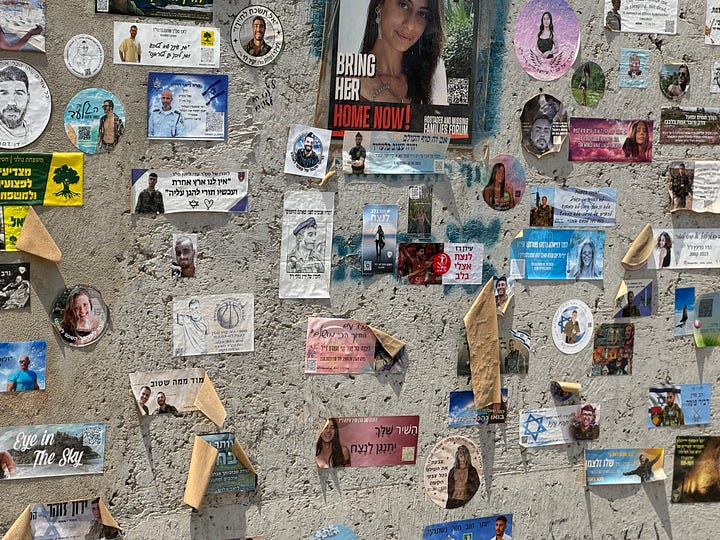
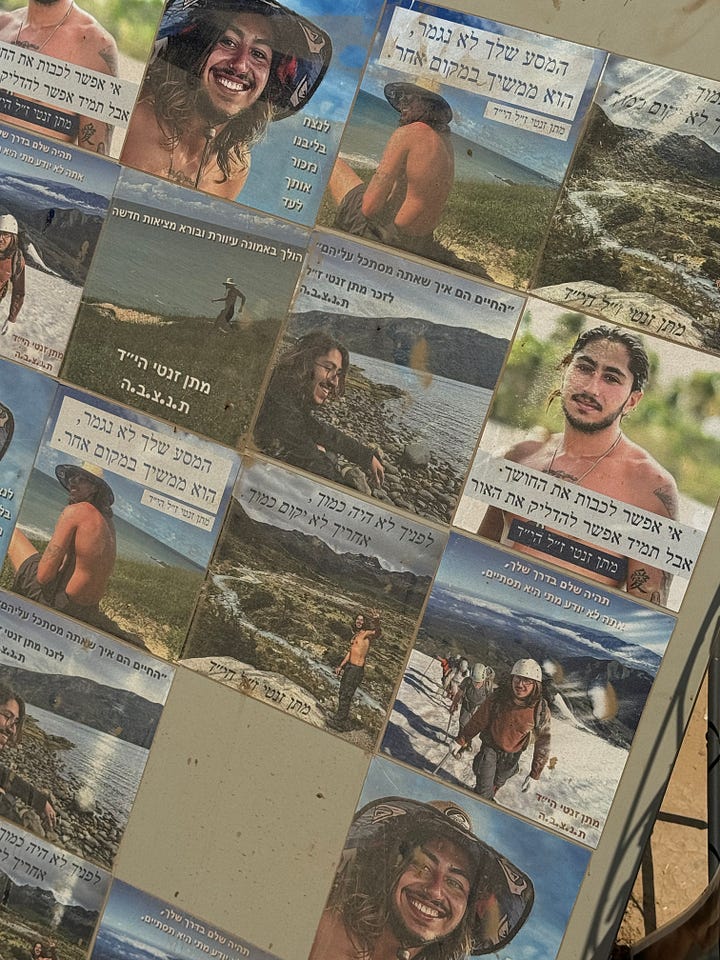
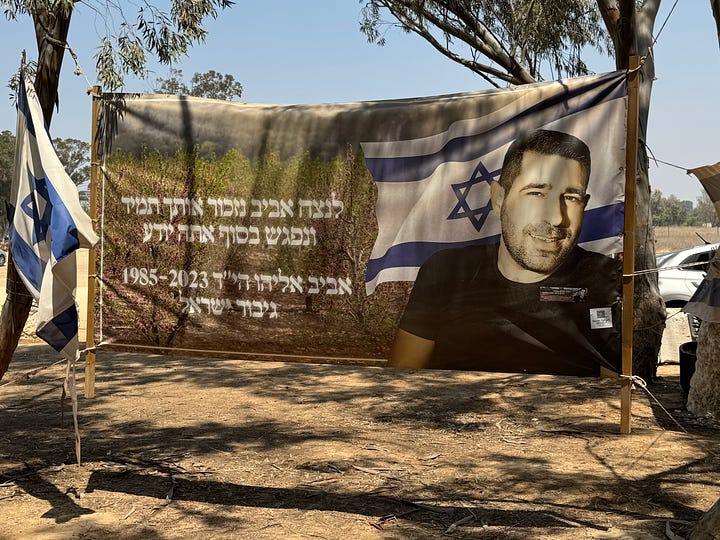
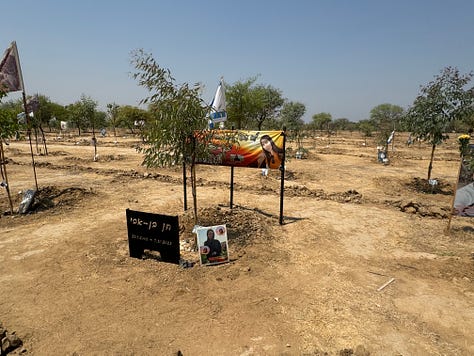
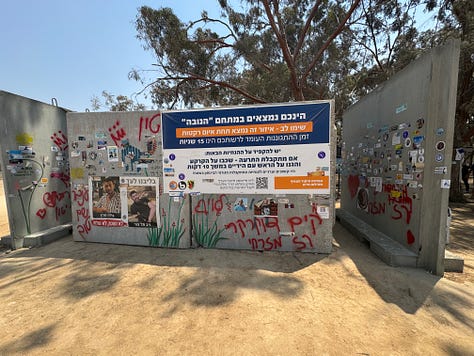
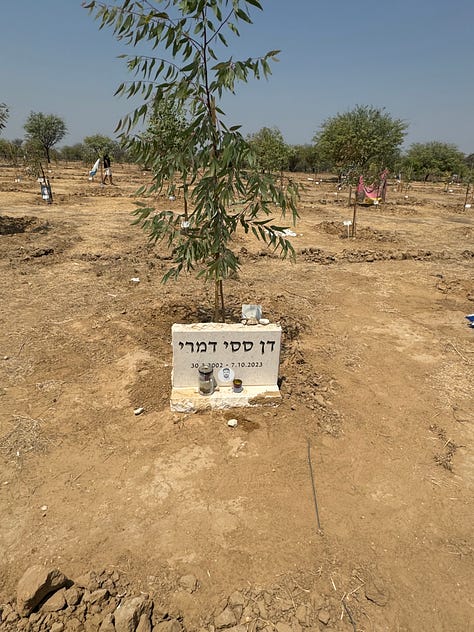
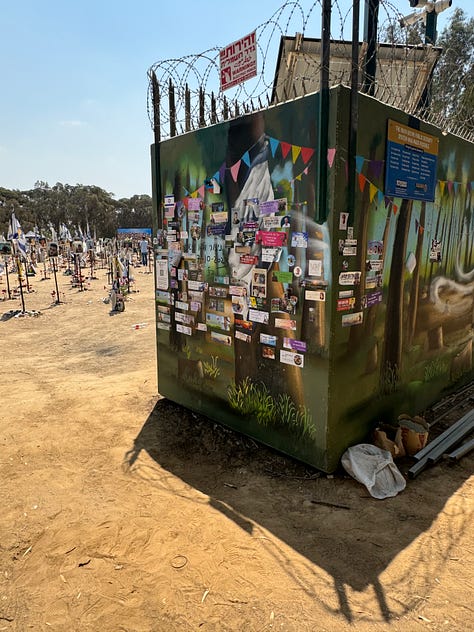
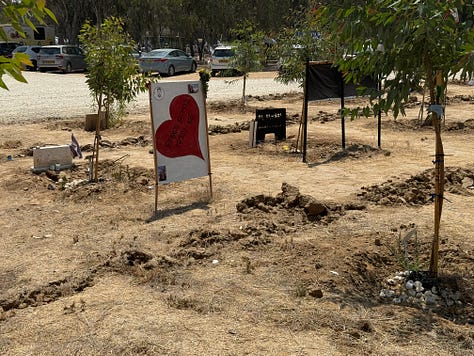
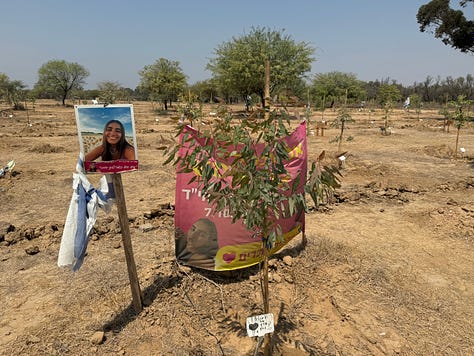
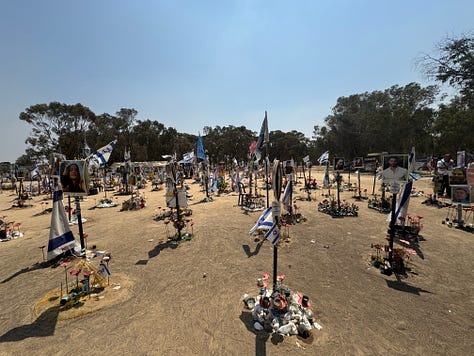
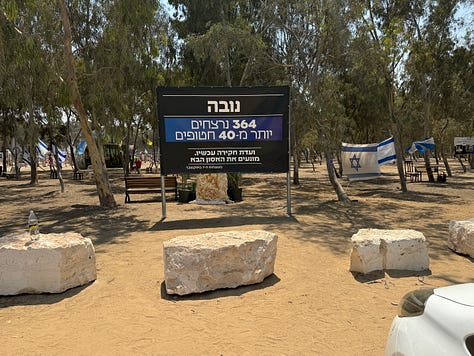
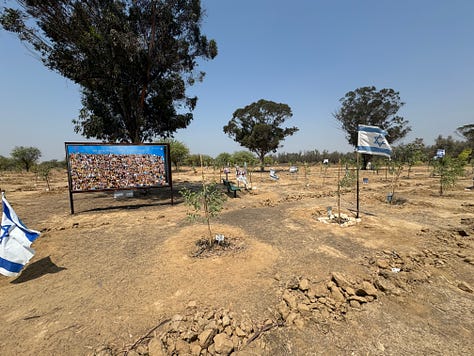
On the way back from Re’im (lower red square], we stopped at the Shuva junction (along Highway 25—see yellow arrows for the highway number, upper red square and the green arrow for the Shuva junction; yellow circles are some of the kibbutzim that were attacked on October 7).
We stopped there because some people have set up a pop-up food stand, still very close to Gaza, where soldiers can stop to get a sandwich, something to drink, etc. No cashier, though—it’s all free.
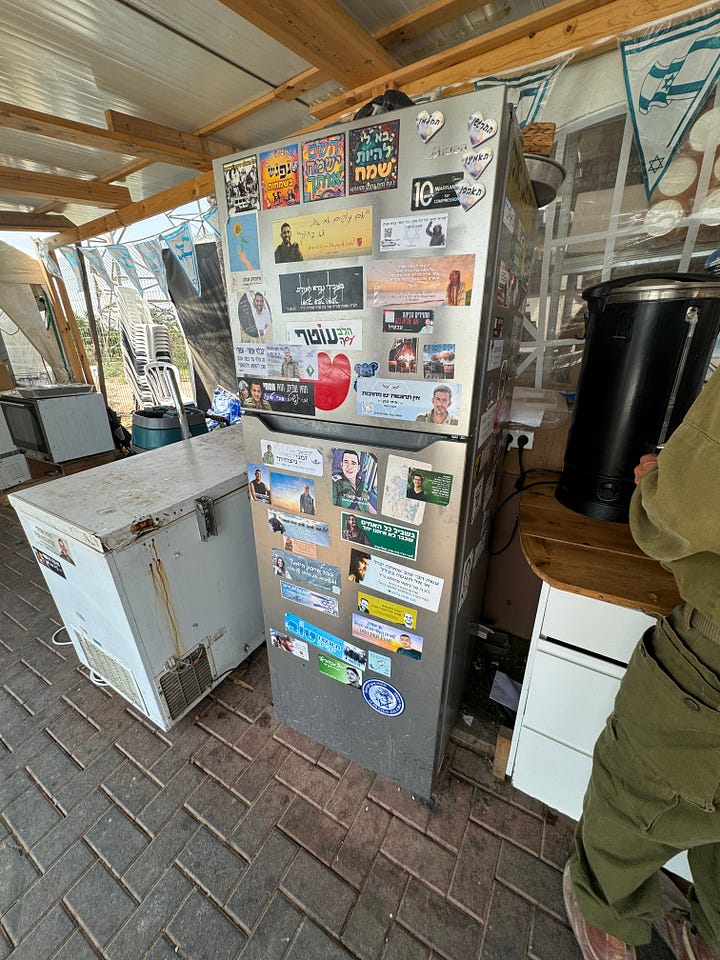
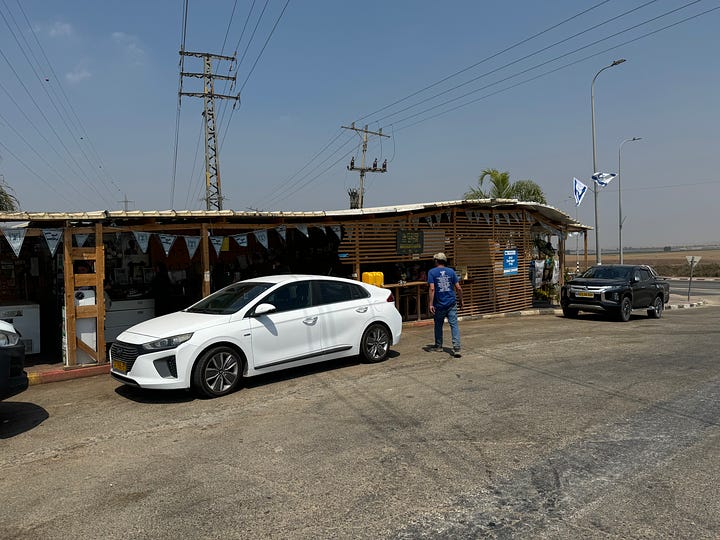
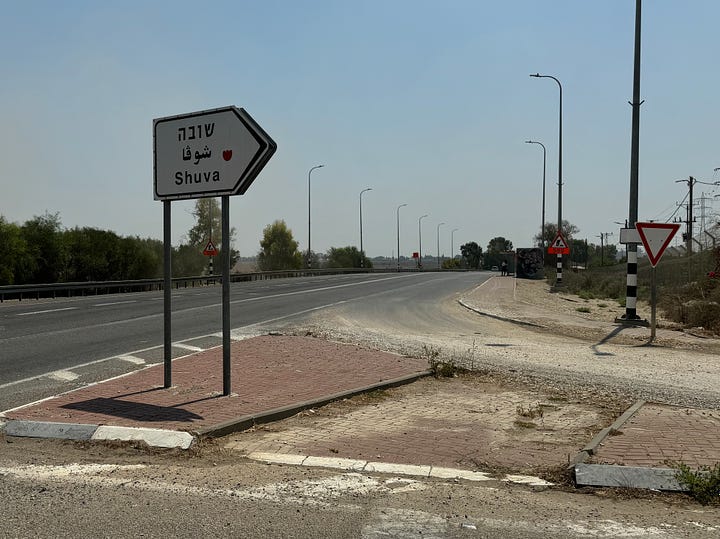
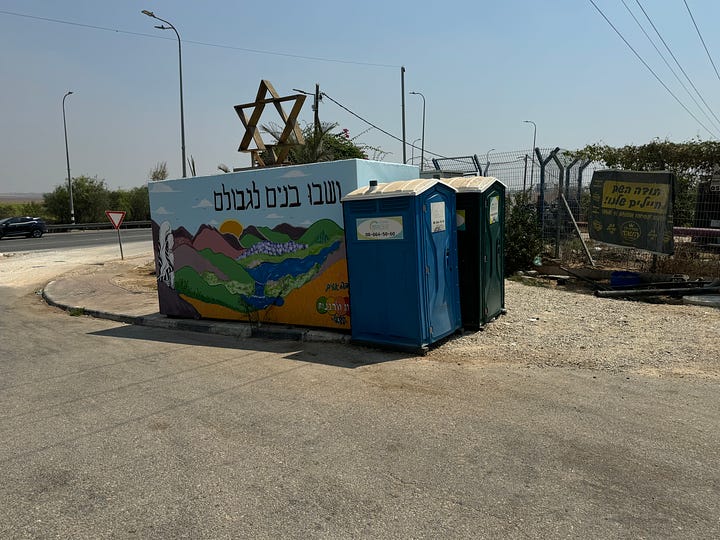
As the sign at the Shuva Junction reads, “And your children shall return to their borders (Jer. 31:17)”:
We pray that that will happen—that the remaining hostages might still come home, and that our kids and our friends’ kids and everyone else serving might soon return to life as we still try to remember it.




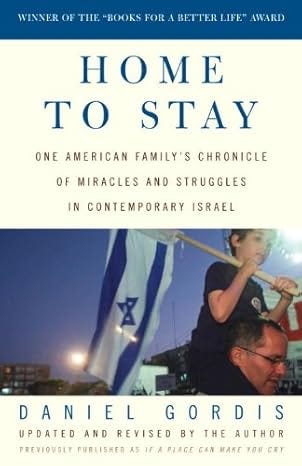

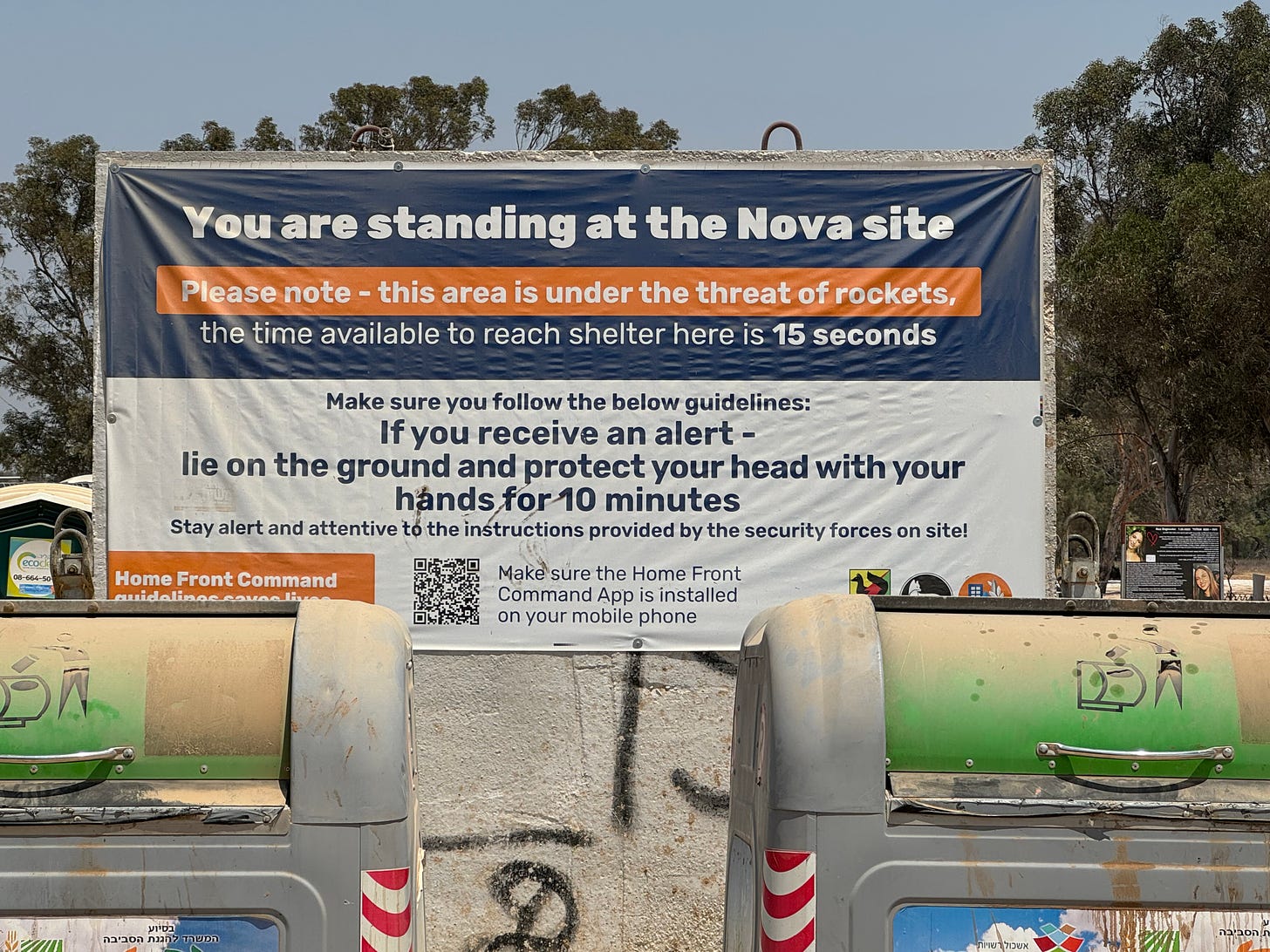
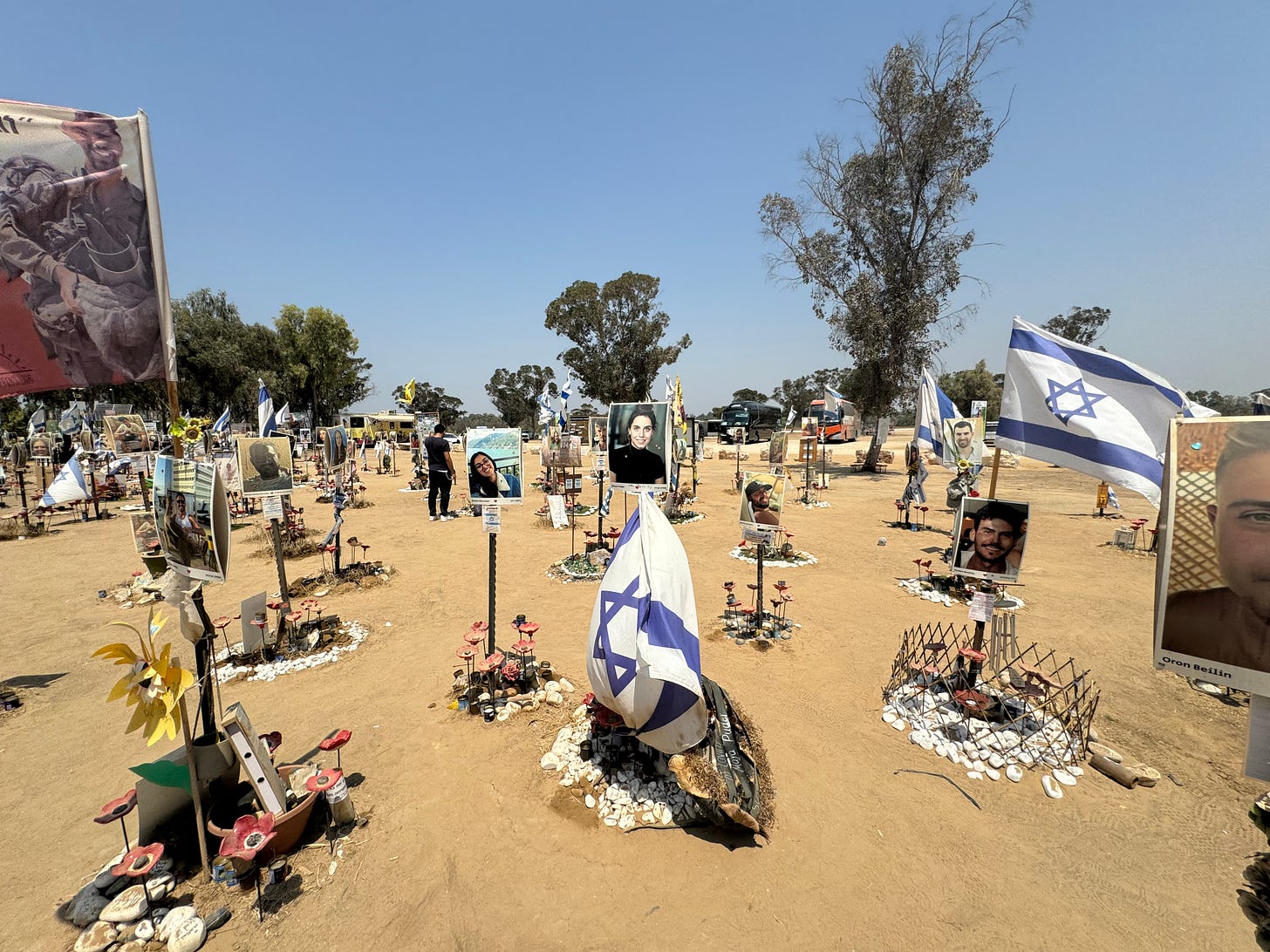
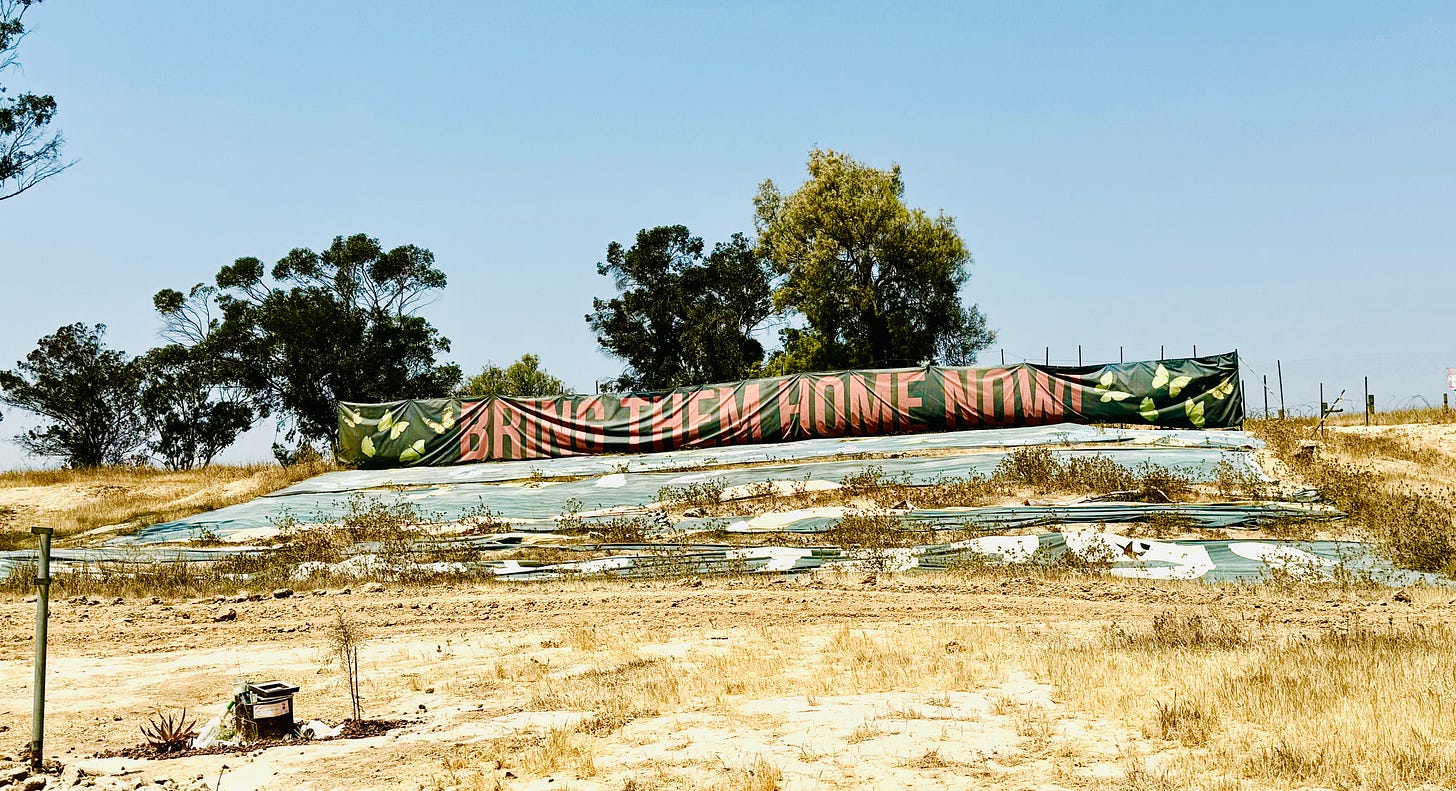
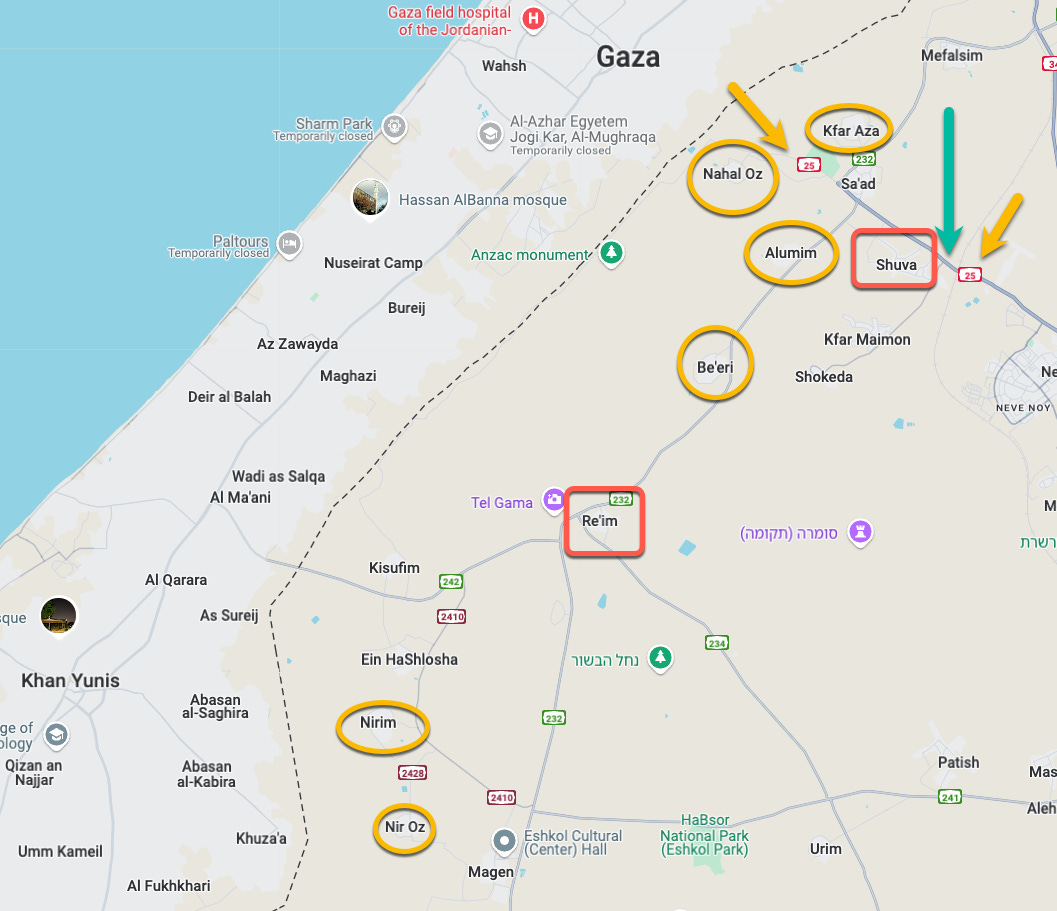
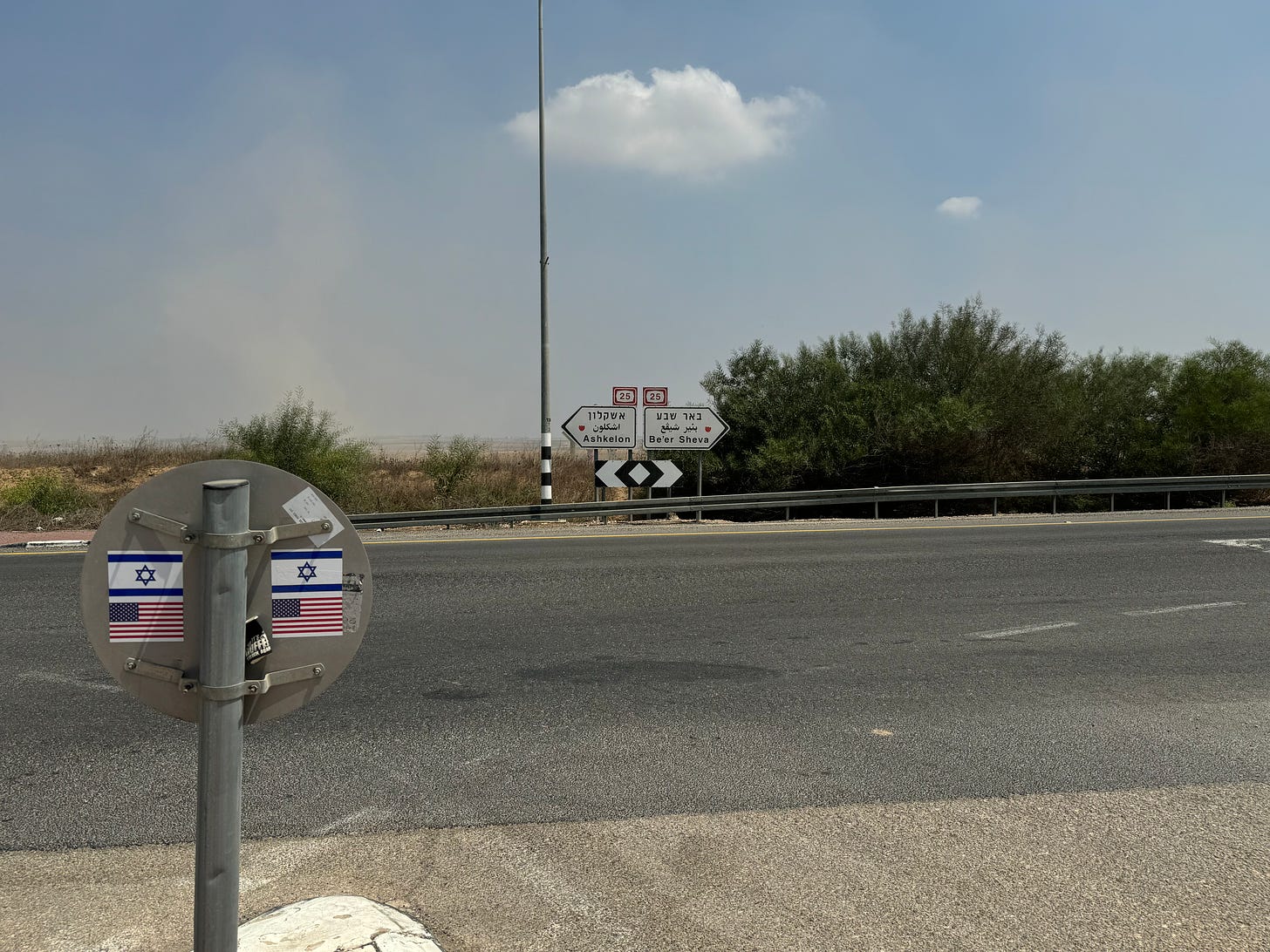
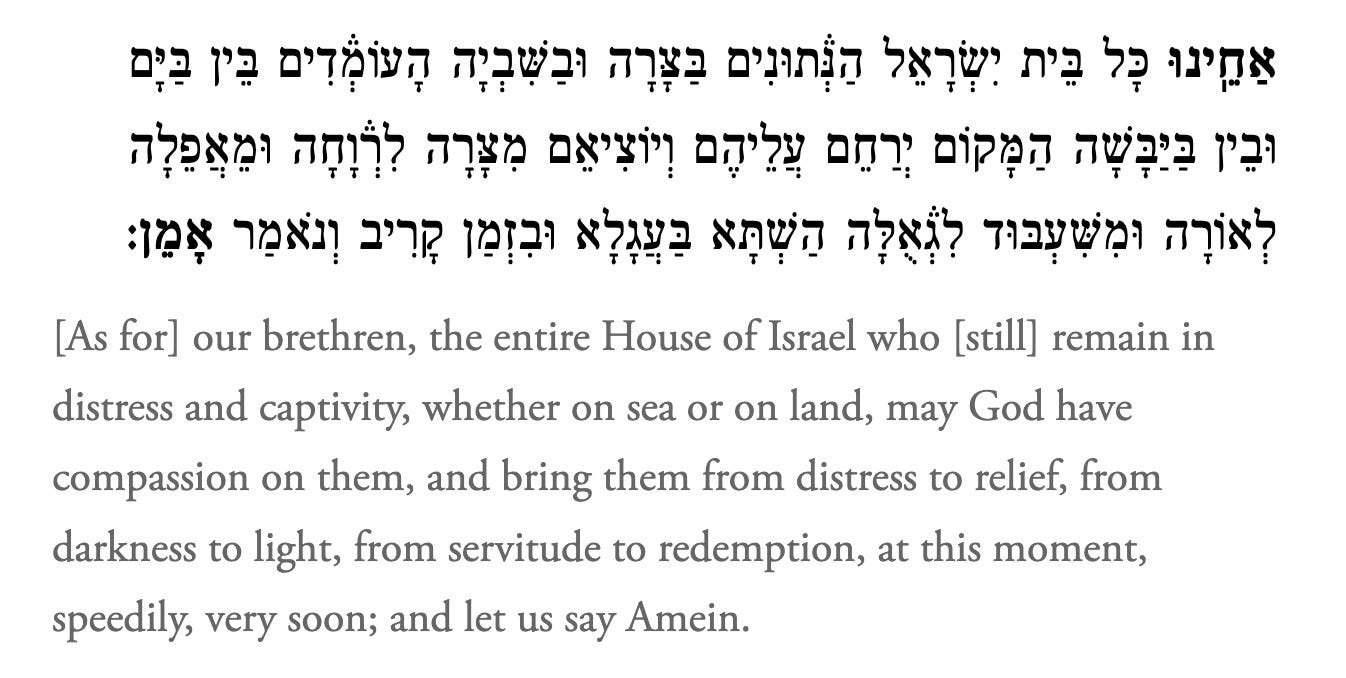





As always, the connection between Israel and America is made clear. But in Israel the pain is still fresh and the memorials of all types speak eloquently. Thanks Daniel for the photos. How touching are the memorials that speak of meeting again one day….